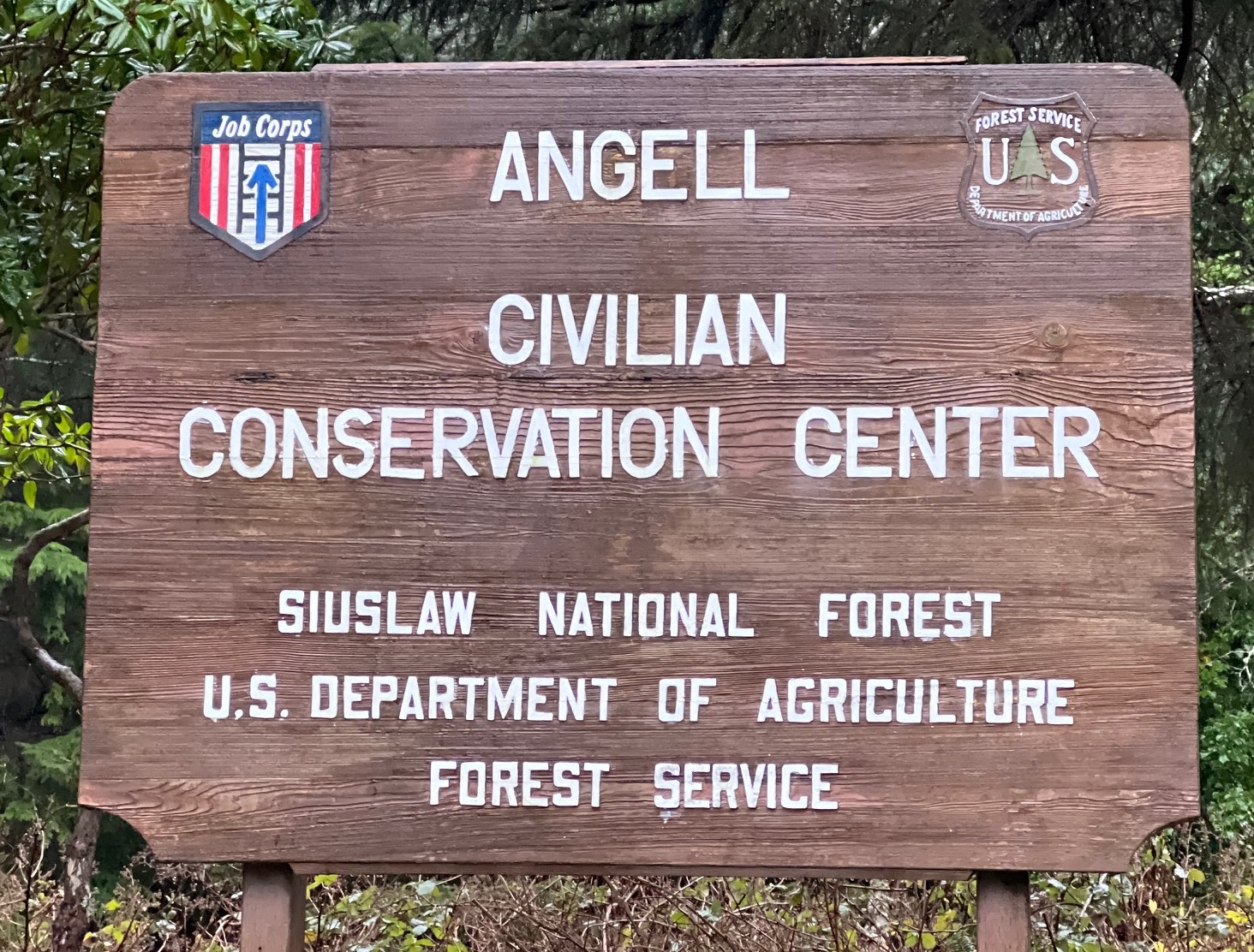
Thursday, June 5, 2025 update:
The National Job Corps Association and other plaintiffs in Tuesday’s lawsuit said the Labor Department does not have the power to dismantle a program established and funded by Congress.
By GARRET JAROS/Lincoln Chronicle
YACHATS – The future of Angell Job Corps is uncertain after the U.S. Department of Labor announced it will pause operations at 99 contractor-operated Job Corps centers across the nation by June 30.
The agency’s surprise announcement Thursday said the decision to begin a phased closure of Job Corps centers aligns with President Trump’s proposed 2026 budget. Trump also moved to close Job Corps centers in 2019, including Angell, but ran into stiff community resistance and opposition by politicians on both sides of the aisle.
But oversight of Job Corps was moved from the U.S. Department of Agriculture to the Labor Department and at least nine centers were shuttered, including some in Oregon and Idaho. The biggest contractor, however, remains the USDA’s Forest Service which operates Angell.

Angell director Steve Delmar, who is a Forest Service employee, said Monday that he has received no word that Angell’s operations will be suspended.
“We’re still doing business and we’re scheduled to do a whole lot of activities up and down the coast,” Delmar told the Lincoln Chronicle. “We’ve got quite a bit going on this time of the year. At this time, we will continue to work. Nobody’s told me not to work.”
Job Corp is the nation’s largest free residential career and education program for low-income young people ages 16-24.
Angell’s closed campus can have as many as 160 students from across the country at any given time who have enrolled to learn a blue collar trade while also furthering their education and honing life skills.
Angell operates like its own small town and has 68 employees when fully staffed. In addition to its extensively-equipped trade shops, there are classrooms, cafeteria, a healthcare center, dormitories, administrative headquarters, a student union with its own store, gym, ball fields, faculty housing and an organic greenhouse garden.

Its students regularly work on projects throughout Lincoln County, including construction, trail work, and volunteering at community events.
Its forestry and natural resources program is a gateway to jobs that include the Forest Service and the U.S. Bureau of Land Management. Angell also has a wildland firefighter program, which won the Organizational Transformation Award at the 2023 Pacific Northwest Regional Foresters ceremony for excellence and its contributions to wildland firefighting.
“We are actually the biggest little program there is,” Delmar said in 2024. “We are probably ranked third or fourth in the Forest Service in hours performed and that’s without an advanced fire training program.”
The exact number of Job Corps centers across the U.S. is difficult to pin down because the national Job Corps site now redirects visitors to a page titled Beyond Job Corps with links to other educational and career-building opportunities.
At last count, however, there were 99 Labor Department contract-operated centers and another 24 operated by the Forest Service “in partnership” with the Department of Labor. Whether that nuance will affect closures is not publicly known.
There are five Job Corps centers in Oregon, two of which have already been told to suspend operations – Tongue Point in Astoria and Springdale in Troutdale.
The three other centers operated by the Forest Service – Timber Lake in Estacada, Wolf Creek in Glide and Angell in Yachats — have not received any official notification.
The News-Review newspaper in Roseburg, however, reported May 23 that while Wolf Creek officials declined to speak publicly, behind the scenes administrators of the program have “told staff and students that its closure is imminent.”

Forest Service is largest contractor
Forest Service Job Corps centers are not directly contracted under the Department of Labor. They operate under an interagency agreement, which means they collaborate on operating the centers.
The Department of Labor said in its announcement Thursday that the Job Corps program had faced significant financial challenges and that it is operating under a deficit projected to reach $213 million this fiscal year.
Earlier this year, the department released a transparency report based on 2023 metrics that cited a 38.6 percent graduation rate. The average cost per student each year, according to the report, is over $80,000. And that recent graduates of the program earn an average starting wage of $16,695 annually.
In the Labor Department’s statement, secretary Lori Chavez-DeRemer said the corps was created to help young adults build a pathway to a better life through education, training, and community.

“However, a startling number of serious incident reports and our in-depth fiscal analysis reveal the program is no longer achieving the intended outcomes that students deserve,” said Chavez-DeRemer, a former Oregon congresswoman. “We remain committed to ensuring all participants are supported through this transition and connected with the resources they need to succeed as we evaluate the program’s possibilities.”
Both of Oregon’s U.S. senators – Ron Wyden and Jeff Merkley have made public statements opposing the closure of Oregon’s Job Corps centers.
A source within Oregon’s Forest Service Job Corps centers who asked to remain anonymous for fear of retaliation, said that while no official word of closure has been passed down, everything is very “hush-hush.”
“So, we don’t know if we are going to get the last-second axe or not,” the source said. “And we probably won’t know until the end of the month. For now, they are kind of leaving the Forest Service centers alone, but they are not telling us anything.”
- Garret Jaros covers the communities of Yachats, Waldport, south Lincoln County and natural resources issues for the Lincoln Chronicle, formerly YachatsNews, and can be reached at GJaros@YachatsNews.com



Contact your government representatives. It is so easy to do. Please help save this program. So far the contract centers in Oregon are on pause but it is only a matter of time before the three Forest Service ones follow.
We must stand up for this wonderful program, as we have several times before. Angell Job Corps is a valuable local resource, both for the kids who receive training and our local communities.
Thank you Senators Wyden and Merkley for standing up for these young people.
Job Corps also works for taxpayers. Last year, 75% of Job Corps’ nearly 50,000 enrollees entered employment or higher education after leaving the program. That could save taxpayers and society as much as $38 billion over their lifetimes! This amounts to a return of almost $23.00 for every $1.00 invested in Job Corps. Source: https://njcaweb.org/job-corps-works/taxpayers/
Yes, have contacted both Oregon senators. This program should definitely not be abolished. Our son is a teacher at Job Corps, for over a decade.
Good, glad to hear that this wasteful program will hopefully be shutdown or privatized. There is no justification for losing $213 million a year when they should be making money for the government. This is exactly what I voted for.
It is a training program. In what way can that make money while they are in the program? Do public high schools make a profit for the government? This so students can enter a career field that pays a living wage.
Somehow both union and non-union apprentices manage to generate income for the shops they work for while getting trained in a skilled trade, and they do it without the government paying 80k a pop. Some king of program can easily be envisioned where Job Corps students actually perform marketable work that finances the program.
The young people there get valuable training in forestry and construction. Not everyone can afford college tuition. They came to my aid when two 70 foot shore pines fell in my yard from a wind storm. The crew cut up the wood for the home heating firewood voucher program and left me with a cord of wood. I am a senior on a fixed income.
While I haven’t students make any money from their work while training, as the nature is them learning, they do save the government money. I’ve seen masonry students work for government sites, such as making a ADA compaint access path at a park and placing pathing at museum. I also believe that the auto students fix government vehicles and donated vehicles. Also, by your logic, we don’t need any form of schools, cause pre K-12 don’t generate money. Also, from what I’ve heard, its the privatized centers that are big time losses.
I have met over the years some of the Angell camp students. What great kids and giving them tools to make a better life for themselves. I have seen hope in their eyes, this is a wonderful program.
Good to see this TSO issuance. Take it to court.
The Trump admin wants to cut these programs (it’s also closing Tongue Point Job Corps in Astoria) while simultaneously both disparaging and attacking higher education and promoting the deelopment of tradework/vocational training.
This demonstrates a serious cognitive dissonance.
And it’s frustrating to read disingenuous comments from its supporters that obviously just parrot its many falsehoods on almost all subjects.
***
Trump Signs Executive Order To Promote Skilled Trade Jobs and Registered Apprenticeships
April 30, 2025 | ABC News, Regulations, Workforce Development
“On April 23, President Donald Trump signed an executive order aimed at overhauling federal workforce development efforts.
The order directs the U.S. Department of Labor, U.S. Department of Education and U.S. Department of Commerce to review and modernize federal workforce programs, focusing on administrative reforms to improve participant experiences and aligning programs with the needs of emerging industries. The agencies are directed to develop a comprehensive workforce strategy to achieve these goals within 90 days.
The executive order also includes a goal of supporting over 1 million government apprenticeships annually by expanding apprenticeships to new industries, improving efficiency and enhancing connections between registered apprenticeships and the education system. The agencies are directed to submit a plan to do so within 120 days.”